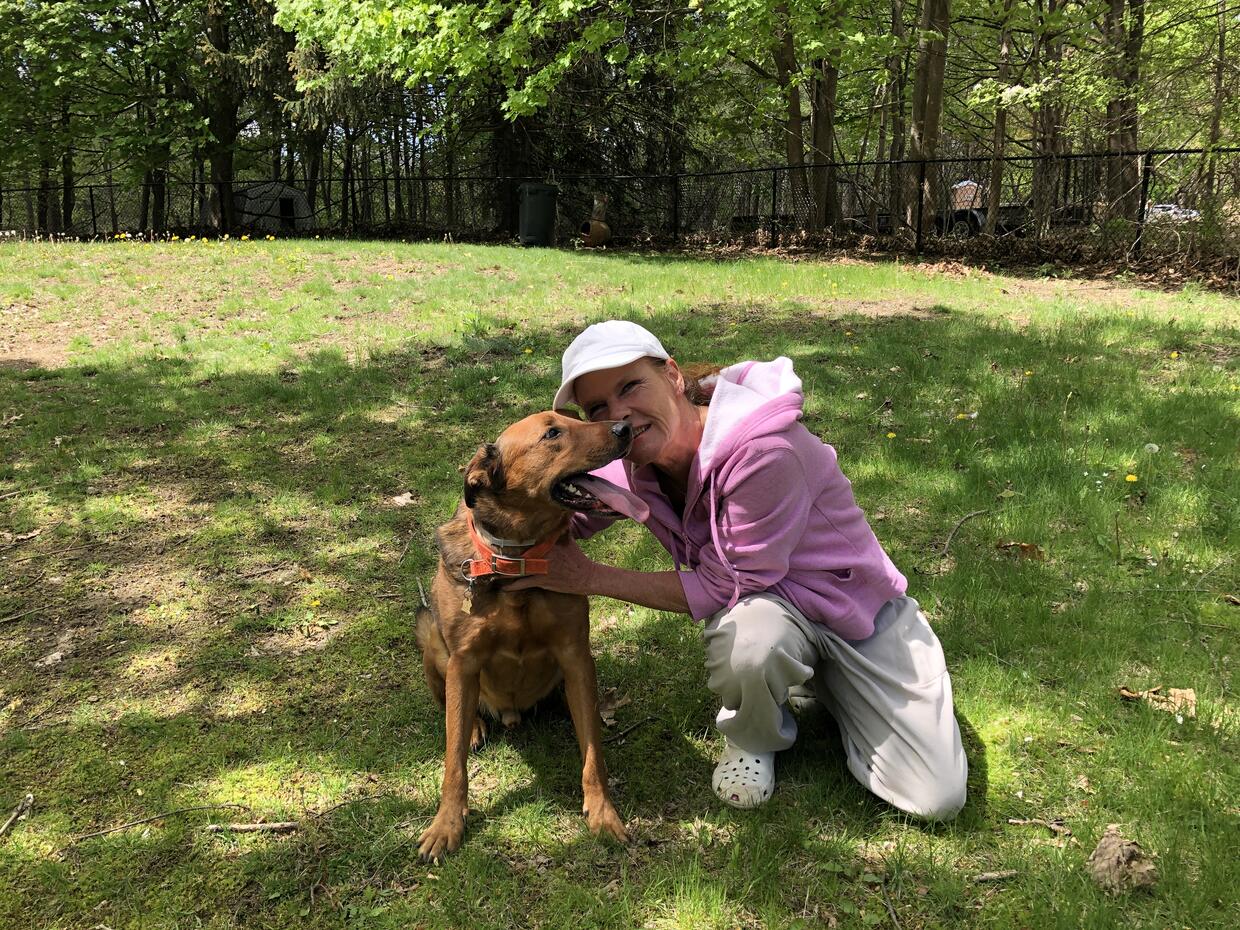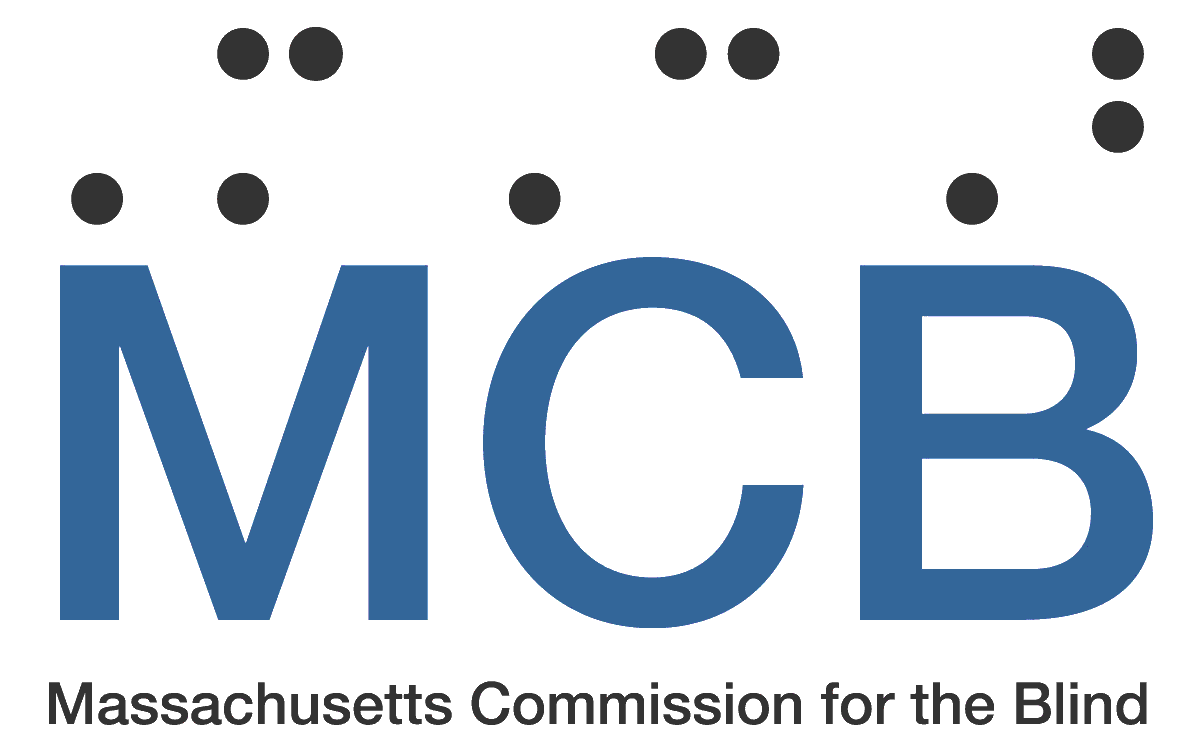- Massachusetts Commission for the Blind
Video: Taking Care of You with Mrs. Magoo - Episode 1
Skip this video Taking Care of You with Mrs. Magoo - Episode 1.By Mary Cresse
By her own description Katie Shannon, who calls herself Mrs. Magoo, has much in common with her namesake, the Sixties-era cartoon character whose myopia gets him into some tricky circumstances. Like Magoo, Katie has low vision and performs her magic on television. She hosts “Taking Care of You with Mrs. Magoo,” a half-hour program available on YouTube and television stations north of Boston. It is produced through a partnership of the nonprofit media centers, Ipswich Community Access Media (ICAM Ipswich) and 1623 Studios. With a target audience of individuals age 50 and over, it's a lighthearted informational show with a focus on individual growth and improvement. Every episode has a segment devoted to vision loss.
The program discusses products, services, tips, and tricks to help manage daily life with vision loss, featuring advice from someone with similar challenges. It’s an apt adjunct to the low vision support group Katie leads via the Massachusetts Association of the Blind and Visually Impaired (MABVI) with support from the Massachusetts Commission for the Blind.
“The show is about taking care of yourself,” says Katie. “Self-care is not an indulgence, it's self-preservation! The goal of my show and support group is to help others acclimate to not only vision loss, but all other issues related to aging in day-to-day situations.”
Katie says that losing your vision is traumatic and acknowledges that people are frightened, depressed, and confused after a diagnosis. That is why she thinks that it is so important to share information about all of the services and products available to individuals who are affected by vision loss. Through her group and television show, Katie’s goal is to offer not simply instruction, but community.
“Low vision groups are great for sharing information. But not only that, it's comforting to be with a group of people who can relate to you and offer friendship. We don’t just talk about low vision all the time. We laugh and talk about everything!
The Show
“Taking Care of You with Mrs. Magoo” is a combination of news, cooking, comedy, do-it-yourself home projects, how to arrange your kitchen, how to apply makeup, the health benefits of cottage cheese. It’s also about advocacy and awareness. Recently Katie hosted a two-part series with Scott Trenti, the CEO of Senior Care, a North Shore organization that offers and coordinates services to elderly and disabled, among others. The topic of the day was how Senior Care might inform the low vision community of the services they offer, with the goal of helping people live independently while remaining active in their communities.
In 1997, upon release of the Disney movie Mr. Magoo, the National Federation for the Blind passed a resolution calling upon Disney to stop production of the film. Letters in such publications as the NFB’s Braille Monitor arrived in support of the protest. The NFB said Mr. Magoo “has perpetuated the old myth that blind people are bumbling, unaware, helpless.”
Even though Mr. Magoo is not a universally beloved character, Katie says that everyone she talks to loves Mr. Magoo.
"I wouldn’t have named my show after a hated character," explains Katie. "Mr. Magoo may have been a partially blind, cantankerous, bumbling old man, but he always seemed to come out on top!"
Katie seems to persevere in the same manner as Mr. Magoo with irreverent humor that is authentic and endearing. In the opening credits of each of her episodes, she stumbles over a fire hydrant, then pats it on its crown, saying, “Aren’t you a cute little boy!” On a walk in the park, Katie tosses her hat into the air, a la Mary Tyler Moore, but the hat gets stuck in a tree—where she can’t find it. In the segment, “Two Blind Broads Go Clamming,” Katie, a resident of Ipswich (home of many clams), decides to go clamming at a local beach. She and another woman who is legally blind enlist a local fisherman, Captain Rick, to show them how to handle the rake. When Katie digs up a rock, she thinks it’s a huge clam, and says, “This could feed a whole family! My goal is for everyone watching the show to learn something and have a good laugh at the same time.”
How It Started
Katie was diagnosed with juvenile macular degeneration (a rare diagnosis) when she was 10 years old. However, vision loss didn’t stop her. She played sports and went to college, earning degrees from Boston University in psychology and sociology. She married and spent eight years in corporate life as a business marketing advisor before moving on to a career in real estate and property management.
In 1995, Katie was diagnosed with retinitis pigmentosa. Her vision continued to deteriorate, notably night and peripheral vision. She started using a white cane (she calls it her "magic wand") 20 years ago. She has blind spots, but she can still see some light, shapes, and forms. However, Katie says that everything is out of focus.
Katie developed the idea for her show in 1995 after receiving constant questions from people inside and outside of the vision loss community. “I want to get information out there—not just for the blind, but for families, and caretakers,” says Katie.” She started researching and compiling information on topics related to vision loss, including issues concerning the elderly, nutrition, beauty, mental health, DIY projects, and more. “I get about twenty or more emails a day for different blogs,” says Katie. “I have compiled so much information, and I was so glad when I started the show so I could share it all!” Katie’s show has a large audience of seniors who are facing vision loss, as well as other conditions. Age-related macular degeneration is the leading cause of severe, permanent vision loss in people over 60.
"It’s all about taking care of yourself," says Katie. "If you don’t, you’re not going to be good for anyone else. To take care of others, you need time to do for yourself."
The setup of Katie’s programs is generally the same with each episode. Each begins with a feature called “Vision Assist” then moves on to an activity, a quick nutrition tip, and finally, a current event (such as how to spot a COVID-19 virus scam).
The “Vision Assist” feature is meant to help people with low vision navigate common tasks, ranging from technology to household chores. Katie says, “If you have low vision or no vision, disorganization and clutter are two of your worst enemies.”
What’s Next?
“I’d like to continue with technology,” said Katie. She adores her Amazon Alexa device and says it is an enormous assist for the blind. She also enjoys her Victor Reader, a handheld media player for the blind and visually impaired, given to her by MCB. “It’s a godsend,” said Katie. “I take it everywhere with me. I use the recording feature to assist in the production of my show in addition to JAWS screen reader technology. “I live to read. I often go to BARD (the Braille and Audio Reading Download from the Library of Congress),” says Katie.
"As far as technology is concerned,” Katie quips, “This is not a bad time to be blind There is so much assistance out there, whether it be products or services. I didn't have any of these things growing up!”
COVID required that Katie tape her show from home, but there is not much that stops her in fulfilling her mission for the low vision community.
“I want people to know that blind people are approachable,” says Katie. “You don't have to walk on eggshells around us! Blindness is one small aspect of anyone's life. So, we shouldn't be defined by it. They say, ‘everyone has got something’. Well, blindness is just one of those things in a list of many.”
Katie lives in Ipswich with her husband, Bob, and her dog Hoover who was aptly named after a vacuum cleaner.

